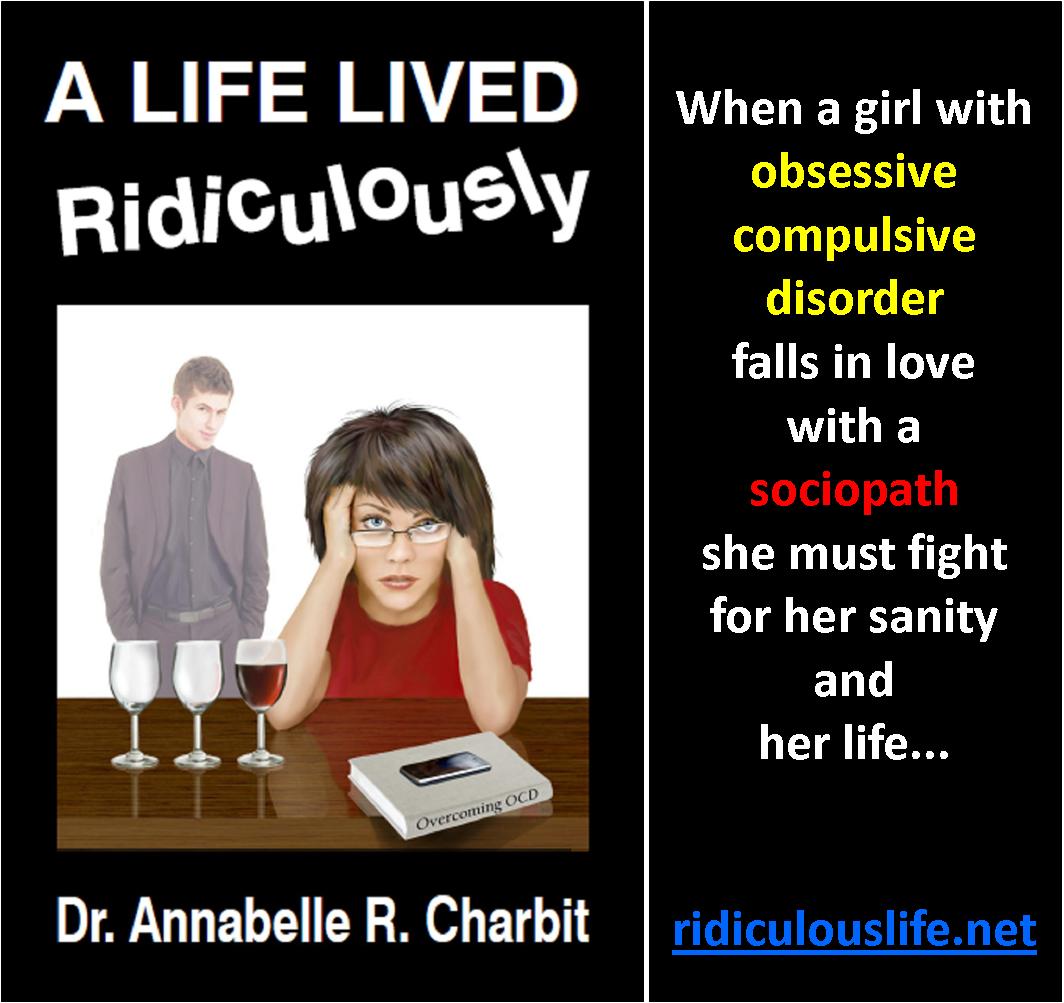When I was a
child, before I'd ever heard of the term obsessive compulsive disorder, I
didn't know what to make of my thoughts, other than that they were embarrassing
and had to be kept secret at all costs.
Fortunately today, OCD is well recognized, so most people have heard of it.
However, without personally experiencing the horror of OCD symptoms, it's
unlikely that others will understand the serious grip that OCD has on a person.
This is only made worse if your particular set of symptoms falls in the
embarrassing end of the spectrum, like the woman who
avoided seeking help for twenty-four years because she was too embarrassed to
reveal she thought she had semen on her hands.
To add insult to embarrassment, gathering the courage to describe your OCD
symptoms out loud can be a huge anti-climax. Words are insufficient and
do little more than trivialize the agonizing vice-like hold that OCD thoughts
and compulsions have on your brain.
To quote from A Life Lived Ridiculously:
I just didn't see how I could possibly
explain all this to another person such that they would get it. "Hi, doc, I'm
here because I don't like the lampshades in my apartment and I can't decide
where the TV should go.' "I'm a doctor, not an interior designer,' is the
response I would expect. "Yeah, but it really bothers me.' "Well, my wife won't
let me take the pool table out of the basement and that really bothers me.'
So here are some ways that you might use to broach the
subject of your OCD:
1) Introduce the conversation by
talking about some of the many famous people who openly have OCD.
David Beckham, Miley Cyrus and Daniel Radcliffe have talked openly about their struggles with the
condition.
Well respected historical figures, such as Charles Darwin, Samuel Johnson and Florence Nightinglale, were also thought to have OCD.
This allows you to gage whether your audience knows about OCD and also allows
you to get some clues as to whether your audience is likely to be sympathetic
or not.
2) Draw people's attention to the
well known TV programs that deal with OCD.
- Detective Monk television series
- Jack Nicholson in As Good As It Gets.
- Obsessed
3) I read an interesting article / novel about OCD. With so much information online and in bookstores, it's easy to inform people. Some great memoirs about OCD include:
- Devil in the details by Jennifer Traig
- It'll be ok: How I kept OCD from ruining my life by Shannon Shy
- Memoirs of a Born Shlepper: Never Give OCD a Third Thought by Rod Fadem
- Rewind, Replay Repeat: A Memoir of Obsessive Compulsive Disorder by Jeff Bell
- A Life Lived Ridiculously by Dr Annabelle R Charbit
Reading a
memoir allows your audience to gain a deep insight into what it's like to live
every day with OCD.
4) It happened to a friend of mine .
Talk about your symptoms as though they were someone else's, Then gage the
reaction of your audience.
5) If you don't wish to speak face to
face with someone, you may always email links about OCD.
6) Explain to others that OCD is a physical illness , no less so than hypothyroidism or heart disease. Understand that OCD is a biological disorder of the brain and learn the neurological pathways (the OCD circuit). Eg the error centers of the brain are overactive due to a lack of serotonergic activity in the orbitofrontal cortex. Some great resources include:
- Brain Lock: Free Yourself from Obsessive-Compulsive Disorder by Jeffery M Schwartz
- Getting Control by Lee Baer
- Tormenting Thoughts and Secret Rituals: The hidden Epidemic of Obsessive Compulsive Disorder by Ian Osborn
7) Join online forums and support groups, and practice talking about it with other sufferers until talking about it becomes second nature.
- OCD Tribe
- Neurotic Planet
- OCD Action
- Psych and Mental Health
- Support Groups
- Social Phobia World
- Stuck In A Doorway
You may also encounter persons with more moving ways to describe
their daily torment, which you can adopt when describing yours.
Will any of these tips make your audience really understand your pain? Probably
not. But it will help you to inform others in a way that is easily accessible
to them and hopefully not so embarrassing for you.
Dr Annabelle R Charbit
Author of A
Life Lived Ridiculously: When a girl with obsessive compulsive disorder,
falls in love with a sociopath, she must fight for her sanity and her life
Buy the book at Amazon
Buy the book at Barnes
and Noble





